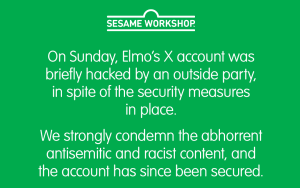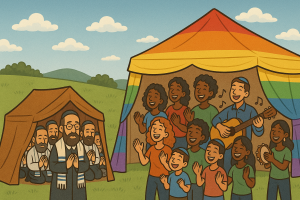Noah Shack will serve as the new CEO of the Centre for Israel and Jewish Affairs (CIJA) after filling the role as interim president of the advocacy organization for the last six months, succeeding Shimon Koffler Fogel.
“He assumes this role at a pivotal moment for our community, and he brings an extraordinary depth of skills, expertise, values, vision, and leadership to meet the challenges ahead,” said CIJA national chair Elan Pratzer, prior to the June 27 announcement. As CEO, Shack oversees the organization’s strategy and day-to-day operations, the Ottawa native having worked nearly two decades in the field of Jewish community advocacy, government relations, and public policy.
Shack arrives at a pivotal moment. A new government is in Ottawa; the Middle East continues to be fluid as the Iran war presents new challenges and opportunities for Israel and the West; and the ground beneath the feet of Canadian Jewry continues to shift.
“I don’t think it’s a choice. We have to be nimble,” Shack told The CJN. “We have to try new things and do whatever we can to win. And absolutely, I think that that has to be our orientation as a community.”
Certainly, there are short- and medium-term goals to be pursued, “but ultimately, our goal is to make the future bright in the long term for the Jewish community, but fundamentally for all Canadians, because Canada, where Jewish people can live free from fear, free from hate, free from harassment and intimidation is a country that upholds those values for all its citizens, and that’s really what’s at stake here.”
Soaring antisemitism, campus unrest, streets filled with disruptive anti-Israel demonstrations that often feature antisemitic rhetoric, all continue. Is there anything new to try? “It’s not necessarily things we haven’t tried,” he says, “although there are things we haven’t tried, but also new approaches to the concepts that we all understand are important.”
Because Jews are just 1 percent of Canada’s population says Shack, who first joined CIJA after it was established in 2011, “we have to be very engaged and active as a community and coordinated to the extent that’s possible. And I think that’s something that really needs to shift. We’ll never have uniformity in the Jewish community, but unity of purpose and approach is really required for us to all make sure that it’s recognized that we’re in this fight together, to be on the same team focused on achieving the same core objectives.”
He says the level of collaboration in the community, across organizations, and across regions, “is really a sea change from where we were a couple of years ago, and there’s still a lot more opportunity to grow that even further.” That means engaging with those beyond the community who stand with Canadian Jewry, so they understand the threat antisemitism poses to their fundamental values, “to their lives here in this country, and to activate them to join us in common cause. There’s a lot of work that’s happening right now to do that… and a lot of untapped potential in that area that can serve us very well.”
The new CEO acknowledges some important initiatives were mothballed when former prime minister Justin Trudeau shuttered Parliament in January, including the Bloc Québécois bill to remove religious exemptions on hate speech and the government’s online hate legislation, but says a new government presents an opportunity to help shape the agenda going forward.
Asked about recent commitments by Prime Minister Mark Carney’s government, like bubble legislation, Shack said he wants to see continuity on that but cautions that creating exclusion zones to keep protesters away from schools, houses of worship and community centres is one thing, as is supporting community security agencies and law enforcement. “That addresses the threat downstream. That’s really imperative, it’s mission critical, and if we don’t do that as a society, we’re in a lot of trouble. But if we only do that, then we’re not going to solve the problem. We have to address it upstream, and one of the things that we’ve raised is the need to fill a gap: enforcing the laws that are on the books and making sure that there’s greater accountability for people who break the law.”
Another gap, he says, is in Canadian law when it comes to the glorification of terrorism. “In the United Kingdom, anti-terror laws prohibit the glorification of terrorist organizations and activities, but in Canada we don’t have that as clearly on the books. Given what we saw in Washington, D.C. and in Colorado, given some of the close calls we’ve had here in Canada that thankfully law enforcement has been able to intercept, coming up with these kinds of strategies to deal with the radicalization of people to violence that’s taking place and targeting our community is an essential ingredient as well.”
Shack says it’s also time to press forward on holding individuals already acknowledged by the authorities accountable for their acts, such as Samidoun, whose Canadian director Charlotte Kates has never had charges laid against her following her arrest in May 2024, a few days after delivering a speech outside the Vancouver Art Gallery where she is alleged to have promoted and incited hatred, according to Vancouver police. The seeming impunity with which she has traveled abroad to Iran, as well as to Beirut last February for the funeral of slain Hezbollah leader Hassan Nasrallah has also raised eyebrows.
“Listing an organization as a terrorist organization is one thing; making sure that has consequence and impact is the next important step… Now it’s for the follow-up action to hold those associated with Samidoun or the IRGC or Hezbollah, or Iran, accountable.”
Shack is confident Canada is moving in the right direction on Iran, following Carney’s recent comments during the NATO summit. “He was quite clear in drawing the link between focusing on the threat that Iran poses, not only in its pursuit of nuclear weapons, but also as a leading state sponsor of terrorism, being the entity responsible for Hamas, Hezbollah and IRGC activities around the world.”
The Iranian threat doesn’t end with the neutralization of uranium enrichment activities, he says. “We have to be vigilant. If we care about a resolution of the war in Gaza, it begins with understanding that Hamas has to be removed, the hostages have to come home, and Iranian interference needs to be addressed.”
There’s a reason Canada doesn’t have diplomatic relations with Iran, says Shack. “This is a regime that tortured, raped and murdered a Canadian photojournalist (Zahra Kazemi); is responsible for the murder of 55 Canadians in the deliberate downing of the Ukrainian airliner which a Canadian court ruled was an act of terrorism; and to say nothing of the horrific acts of terror the Iranian regime has sponsored, like the bombing of the Jewish community centre in Buenos Aires and of course, October 7, as well as close to home the assassination plot against Irwin Cotler.”
This is something that should be a clear consensus issue, he says, and one where Canada should lead. “Obviously, international dynamics are very complex these days, but I think this is an issue where we can have some real moral clarity as a country.”
Author

Joel has spent his entire adult life scribbling. For two decades, he freelanced for more than a dozen North American and European trade publications, writing on home decor, HR, agriculture, defense technologies and more. Having lived at 14 addresses in and around Greater Montreal, for 17 years he worked as reporter for a local community newspaper, covering the education, political and municipal beats in seven cities and boroughs. He loves to bike, swim, watch NBA and kvetch about politics.
View all posts








